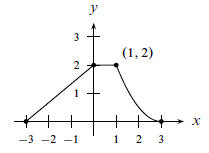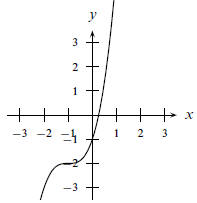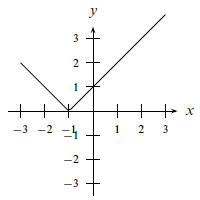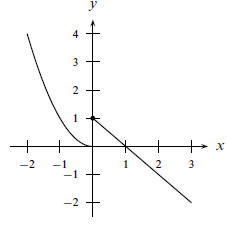College Algebra Test
9. Answer each of the following questions concerning the
graph to the lower -right.
(a) Determine the range and domain of the function f from its graph, given
to the right below. Use interval notation.
Solution:
Domain = [−3, 3]
Range = [ 0, 2]
(b) State the intervals of increase and decrease.
Interval of increase = [−3, 0]
Interval of decrease = [ 1, 3]

10. The graph of the function y = x^2 is shifted
horizontally 2 units to the left, and shifted 4 units vertically upwards.
Write the equation of the resulting function:

11. Sketch each of the following graphs using transformation methods .
 Solution:  |
(b) g(x) = |x + 1|. Solution:  |
12. Solve the absolute inequality : |1 − 2x| ≥ 6
Solution: We have, again,
|
|1 − 2x| ≥ 6 |
||
| 1 − 2x ≥ 6 | or | 1 − 2x ≤ −6 |
| −2x ≥ 5 | or | −2x ≤ −7 |
| x ≤ −5/2 | or | x ≥ 7/2 |
The solution set is (−∞,−5/2) ∪ [7/2,∞)
13. Answer each of the following concerning piecewise-defined function

(a) (2 pts) Calculate each of the following :
f (4)= −3
f (−3) = 9
(b) (4 pts) Graph the function on the axis to the right.
Be
sure to indicate the value of the function at x = 0 on
the graph.

14. Let f (x) = 2x^2 − x and g(x) = 3x + 1, perform the following compositions.

15. Consider the function Find
functions f and g such that
Find
functions f and g such that 

16. Solve the following system using the elimination method . Leave your answer as a solution set.

Solution Set ={(1/2, 1/3)}
Solution: We use the elimination method:
| 2x + 3y = 2 | (1) | |
| 4x − 3y = 1 | (2) | |
| 4x + 6y = 4 | (3) | multiply (1) by 2 |
| 4x − 3y = 1 | (2) | copy of equation (2) |
| 9y = 3 | (4) | subtract (2) from (3) |
| y = 1/3 | (5) | solve |
| 2x + 3(1/3) = 2 | substitute (5) into (1) | |
| x = 1/2 | solve! | |
| The solution set is { (1/2, 1/3) } |
| Prev | Next |